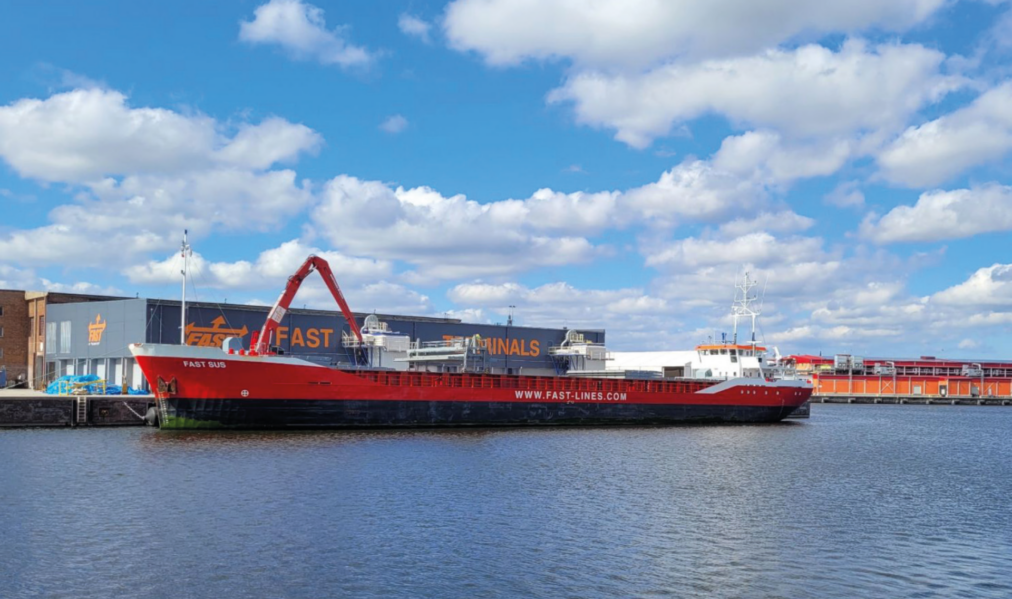Seatalk interview with Iga Cierpal (Fast Lines): “Every day is fascinating!”
23/01/2024
-
“I grew up in Czestochowa, a town in the south of Poland. My home town is about 400 km (250 miles) from the coast, and no family members are active in the maritime world. Still, at eighteen, I chose to study Maritime Transport and Logistics. It was at an information fair on higher education that this course caught my eye. I was instantly intrigued and enrolled at the Gdynia Maritime University. I’ve been working in this fascinating industry for some time now, and have not regretted my choice one single moment.”
What was your first professional experience in the maritime industry?
“I was still in my last master’s year at university when I got the opportunity to apply for a job at classification agency DNV. I could start immediately, but I still had to attend classes at the same time. Combining a new job with my studies was challenging, but then Covid put the world on hold. Classes were cancelled or went online, and I had to practise my job from home as well. Funny enough, the pandemic made it somewhat easier for me to combine both activities.”
“My function at DNV consisted of verifying shipping companies’ reports on their ships’ CO2 emissions and fuel consumption. I learned about the guidelines on making the maritime industry sustainable, imposed by the International Maritime Organisation (IMO) and the EU. So you could say that’s where my interest in ecology and sustainability sparked.”
You had a nice job and an extensive network in Poland. How did you finally end up in Belgium?
“There’s a very simple reason for that: love! I met my Belgian boyfriend during my Erasmus scholarship in Norway. A long-distance relationship is hard to sustain, and so we decided I would make the move. I’ve been living here since June 2023.”
“Even before I left Poland, I was looking for a job in Flanders. My first online interview was for this job at Fast Lines. After I arrived in Belgium, there was a second meeting here at the office. I was over the moon when they offered me a contract, and I could start working immediately.
“I take care of all reports on sustainability within the Fast Group. Furthermore, I analyse and evaluate our collected data to determine what we should focus on more. Caring for people and the environment is ingrained in Fast Lines’ DNA, which is one of the reasons why I love working here. My second role in the company focuses on chartering. I’m still learning a lot about freighting, renting ships and other aspects of the job. It’s such an interesting subject; every day is fascinating!”
Fast Lines covers a whole range of logistics solutions. Besides shortsea shipping, you also offer services such as ship management, storage, etc. It must be challenging to work out a sustainability policy for this variety of activities?
“Indeed, but we don’t have to do it on our own. We consult with interested parties in this process, such as our customers, subcontractors and other stakeholders. For example, we recently sent out a survey to internal and external partners. With the survey, we want to learn where we can make the most impact for them economically, organisationally, but also ecologically. We also get much support from umbrella organisations like the Royal Belgian Shipowners’ Association (KBRV).”

Currently, you focus mainly on collecting information and data to carry out a sustainability policy. Could you give us some clear examples of ecological initiatives already taken by Fast Lines?
“The renewal of our fleet is already a huge step forward in terms of greening. We recently ordered two new vessels with the Dutch shipbuilder Damen. The 3800-dwt ships sailing under the Belgian flag will be equipped with a fuel-efficient main engine in addition to a new hull design. They will also receive Damen’s remote monitoring system, which sends real-time information on fuel consumption and CO2 emissions to the crew and our offices. Damen takes pride in its ships having the lowest EEDI (Energy Efficiency Design Index) in shortsea shipping.
A more fuel-efficient ship can hardly be found at this moment!”
A more sustainable maritime industry is a must for our planet’s future. But what about your own future? What lies ahead for Iga?
“I will stay active in the maritime world anyhow. Preferably for a long time at Fast. I am grateful for the opportunities they gave me, and I still have much to offer to the company. Furthermore, I would like to improve my Dutch in the future. I’ve been following a Dutch course at CVO for some time now, but it’s not an easy language to master. To a Polish native, Dutch often doesn’t make any sense! And don’t get me started on all the different dialects!”
“I’ve been living in Gent for six months, so I already got to know that city somewhat. The living is nice, and I’m starting to feel at home. Antwerp, on the other hand, is still uncharted territory. I want to take the time to discover the city in the coming months because I’ve heard many good things about it from friends and colleagues. So far, I only know the itinerary from the railway station to the Fast Lines offices. Some days, I find the commute from Gent quite burdensome. But it won’t be easy to convince my boyfriend to make the move to Antwerp.”
Author: Nick Hastir
Photos: www.fast-lines.com
The interview was published in Seatalk (10th Edition, 2024).

-
-
Stay informed
-
Sign up for our press release news
-

